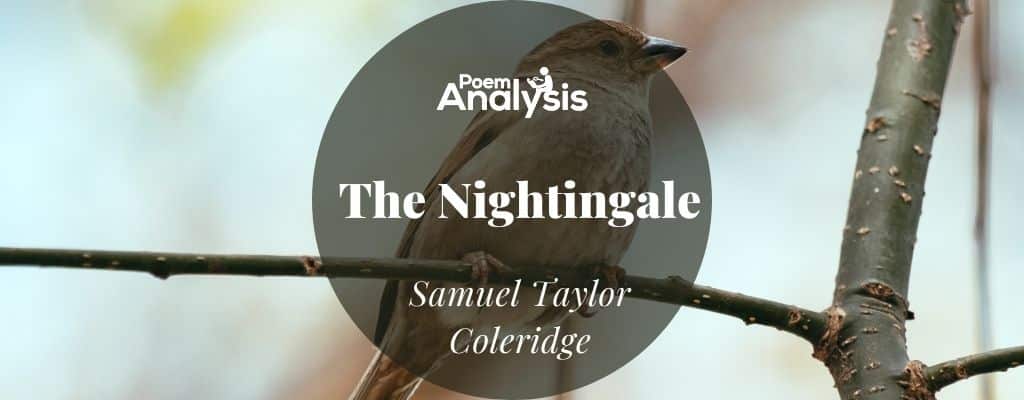In this poem, ‘The Nightingale’, Samuel Taylor Coleridge reflects on the figure of the nightingale. The nightingale, a recurrent topic in literature, is usually described as a “melancholic bird”. The lyrical voice of the poem will contradict this and will talk about common images that refer to nature. Throughout the poem, Samuel Taylor Coleridge wants to establish a new vision towards nature, which is dissimilar to the embodiment of human sensations and feelings. Nature, consequently, has to be described with its own language and images; it represents joy and not sorrow (like it did for some poets). Therefore, there is a need to detach from the image of nature all the melancholic words and images that those previous poets had written and created. In ‘The Nightingale’, the lyrical voice will describe nature in a different way in order to portray its true meaning.
‘The Nightingale’ has a subtitle: “A Conversation Poem”. This refers not only to the main theme of the poem, which depicts a conversation and an exchange of thoughts and ideas about nature, but, also, to the form of the poem. The poem is constructed in the blank-verse form, with unrhymed lines in iambic pentameter. Samuel Taylor Coleridge will use this form in order to emulate the natural form of speech. ‘The Nightingale’ has many musical and metrical effects that create a special rhythm that is particular to Coleridge’s poetry. The poem focuses on this musicality rather than on images built by difficult linguistic constructions. The language that Coleridge uses is simple, recreating the conversational tone already mentioned, but it builds strong and profound images. Some critics state that this poem is similar both in theme and form to the ones his friend William Wordsworth wrote.
The Nightingale Samuel Taylor ColeridgeNo cloud, no relique of the sunken dayDistinguishes the West, no long thin slipOf sullen light, no obscure trembling hues.Come, we will rest on this old mossy bridge!You see the glimmer of the stream beneath,But hear no murmuring: it flows silently.O’er its soft bed of verdure. All is still.A balmy night! and though the stars be dim,Yet let us think upon the vernal showersThat gladden the green earth, and we shall findA pleasure in the dimness of the stars.And hark! the Nightingale begins its song,‘Most musical, most melancholy’ bird!A melancholy bird? Oh! idle thought!In Nature there is nothing melancholy.But some night-wandering man whose heart was piercedWith the remembrance of a grievous wrong,Or slow distemper, or neglected love,(And so, poor wretch! filled all things with himself,And made all gentle sounds tell back the taleOf his own sorrow) he, and such as he,First named these notes a melancholy strain.And many a poet echoes the conceit;Poet who hath been building up the rhymeWhen he had better far have stretched his limbsBeside a brook in mossy forest-dell,By sun or moon-light, to the influxesOf shapes and sounds and shifting elementsSurrendering his whole spirit, of his songAnd of his fame forgetful! so his fameShould share in Nature’s immortality,A venerable thing! and so his songShould make all Nature lovelier, and itselfBe loved like Nature! But ‘twill not be so;And youths and maidens most poetical,Who lose the deepening twilights of the springIn ball-rooms and hot theatres, they stillFull of meek sympathy must heave their sighsO’er Philomela’s pity-pleading strains.My Friend, and thou, our Sister! we have learntA different lore: we may not thus profaneNature’s sweet voices, always full of loveAnd joyance! ‘Tis the merry NightingaleThat crowds and hurries, and precipitatesWith fast thick warble his delicious notes,As he were fearful that an April nightWould be too short for him to utter forthHis love-chant, and disburthen his full soulOf all its music!And I know a groveOf large extent, hard by a castle huge,Which the great lord inhabits not; and soThis grove is wild with tangling underwood,And the trim walks are broken up, and grass,Thin grass and king-cups grow within the paths.But never elsewhere in one place I knewSo many nightingales; and far and near,In wood and thicket, over the wide grove,They answer and provoke each other’s song,With skirmish and capricious passagings,And murmurs musical and swift jug jug,And one low piping sound more sweet than allStirring the air with such a harmony,That should you close your eyes, you might almostForget it was not day! On moonlight bushes,Whose dewy leaflets are but half-disclosed,You may perchance behold them on the twigs,Their bright, bright eyes, their eyes both bright and full,Glistening, while many a glow-worm in the shadeLights up her love-torch.A most gentle Maid,Who dwelleth in her hospitable homeHard by the castle, and at latest eve(Even like a Lady vowed and dedicateTo something more than Nature in the grove)Glides through the pathways; she knows all their notes,That gentle Maid! and oft, a moment’s space,What time the moon was lost behind a cloud,Hath heard a pause of silence; till the moonEmerging, a hath awakened earth and skyWith one sensation, and those wakeful birdsHave all burst forth in choral minstrelsy,As if some sudden gale had swept at onceA hundred airy harps! And she hath watchedMany a nightingale perch giddilyOn blossomy twig still swinging from the breeze,And to that motion tune his wanton songLike tipsy Joy that reels with tossing head.Farewell! O Warbler! till tomorrow eve,And you, my friends! farewell, a short farewell!We have been loitering long and pleasantly,And now for our dear homes.That strain again!Full fain it would delay me! My dear babe,Who, capable of no articulate sound,Mars all things with his imitative lisp,How he would place his hand beside his ear,His little hand, the small forefinger up,And bid us listen! And I deem it wiseTo make him Nature’s play-mate. He knows wellThe evening-star; and once, when he awokeIn most distressful mood (some inward painHad made up that strange thing, an infant’s dream)I hurried with him to our orchard-plot,And he beheld the moon, and, hushed at once,Suspends his sobs, and laughs most silently,While his fair eyes, that swam with undropped tears,Did glitter in the yellow moon-beam! Well!It is a father’s tale: But if that HeavenShould give me life, his childhood shall grow upFamiliar with these songs, that with the nightHe may associate joy. Once more, farewell,Sweet Nightingale! once more, my friends! farewell.
The Nightingale Analysis
Stanza One
No cloud, no relique of the sunken day
Distinguishes the West, no long thin slip
Of sullen light, no obscure trembling hues.
Come, we will rest on this old mossy bridge!
You see the glimmer of the stream beneath,
But hear no murmuring: it flows silently.
O’er its soft bed of verdure. All is still.
A balmy night! and though the stars be dim,
Yet let us think upon the vernal showers
That gladden the green earth, and we shall find
A pleasure in the dimness of the stars.
And hark! the Nightingale begins its song,
‘Most musical, most melancholy’ bird!
A melancholy bird? Oh! idle thought!
In Nature there is nothing melancholy.
But some night-wandering man whose heart was pierced
With the remembrance of a grievous wrong,
Or slow distemper, or neglected love,
(And so, poor wretch! filled all things with himself,
And made all gentle sounds tell back the tale
Of his own sorrow) he, and such as he,
First named these notes a melancholy strain.
And many a poet echoes the conceit;
Poet who hath been building up the rhyme
When he had better far have stretched his limbs
Beside a brook in mossy forest-dell,
By sun or moon-light, to the influxes
Of shapes and sounds and shifting elements
Surrendering his whole spirit, of his song
And of his fame forgetful! so his fame
Should share in Nature’s immortality,
A venerable thing! and so his song
Should make all Nature lovelier, and itself
Be loved like Nature! But ’twill not be so;
And youths and maidens most poetical,
Who lose the deepening twilights of the spring
In ball-rooms and hot theatres, they still
Full of meek sympathy must heave their sighs
O’er Philomela’s pity-pleading strains.
This first stanza establishes the place where the lyrical voice’s reflection will take place. The lyrical voice describes this “old mossy bridge” which functions as a dramatic setting, where things occur with immediacy (And hark! the Nightingale begins its song). There is, also, a direct interpellation to the reader (“Come”) in the beginning of this stanza. The scenery will be carefully portrayed by the lyrical voice leaving no detail behind. The construction of this place, greatly surrounded by nature (“O’er its soft bed of verdure”), is what prepares the criticism that the lyrical voice will present. The description is focused on depicting the natural features of the landscape in a sensible and beautiful way. The lyrical voice starts talking about the nightingale when he/she sees that the bird starts singing. The song of the bird will function as the trigger for the reflection, enabling the lyrical voice’s problematization of the figure of the nightingale. The description of the bird begins with a quote from Milton’s Il Penseroso (‘Most musical, most melancholy’).
This passage contains a dramatic property that concentrates the thought of the previous generation. The Lyrical voice, then, will contradict this to establish the true character of the nightingale (“A melancholy bird? Oh! idle thought!”) and, also, the true character of nature (“In Nature there is nothing melancholy”). The lyrical voice states that one man once made up the wrong impression about nature and that, then, poets followed him. The lyrical voice refers indirectly to Milton again (“Poet who hath been building up the rhyme”) and says that poets had externalized their own emotions into the portrayal of nature. On the other hand, the lyrical voice believes that poetry “Should make all Nature lovelier, and itself /Be loved like Nature!”. Finally, the lyrical voice references the classic myth of Philomena, where the nightingale is described as a transformed maiden, for being another incorrect way of describing the nightingale’s song.
Stanza Two
My Friend, and thou, our Sister! we have learnt
A different lore: we may not thus profane
Nature’s sweet voices, always full of love
And joyance! ‘Tis the merry Nightingale
That crowds and hurries, and precipitates
With fast thick warble his delicious notes,
As he were fearful that an April night
Would be too short for him to utter forth
His love-chant, and disburthen his full soul
Of all its music!
This second stanza begins with another direct interpellation. Here, “My Friend, and thou, our Sister!” refers to William and Dorothy Wordsworth. The lyrical voice will continue explaining what he said in the previous stanza; describing nature with personal emotions is a way to “profane” the environment. Nature is described as full of love and joy, but misunderstood by many. Notice the imagery created around nature and how it represents all good things. On the contrary, there is the imagery of those who can’t understand nature; they break the sweet and noble atmosphere that nature establishes. Therefore, this stanza accentuates and emphasizes the notion of nature that the lyrical voice established in the first stanza.
Stanza Three
And I know a grove
Of large extent, hard by a castle huge,
Which the great lord inhabits not; and so
This grove is wild with tangling underwood,
And the trim walks are broken up, and grass,
Thin grass and king-cups grow within the paths.
But never elsewhere in one place I knew
So many nightingales; and far and near,
In wood and thicket, over the wide grove,
They answer and provoke each other’s song,
With skirmish and capricious passagings,
And murmurs musical and swift jug jug,
And one low piping sound more sweet than all
Stirring the air with such a harmony,
That should you close your eyes, you might almost
Forget it was not day! On moonlight bushes,
Whose dewy leaflets are but half-disclosed,
You may perchance behold them on the twigs,
Their bright, bright eyes, their eyes both bright and full,
Glistening, while many a glow-worm in the shade
Lights up her love-torch.
This stanza depicts a particular place. The lyrical voice describes a neglected grove that is near an enormous castle. This abandoned place is characterized as forgotten, with “Thin grass and king-cups grow within the paths”. However, the lyrical voice says that this place is full of nightingales that sing frequently. The imagery of the description of the place is very distant from the description of the song of the nightingales, producing an oxymoron. Notice, also, how the nightingales’ songs are described, the words used, and how they “answer and provoke each other’s song”. The song of the nightingales becomes a sort of ritual, a natural wonder. The lyrical voice seems mesmerized by this place and by the song of the nightingales.
Stanza Four
A most gentle Maid,
Who dwelleth in her hospitable home
Hard by the castle, and at latest eve
(Even like a Lady vowed and dedicate
To something more than Nature in the grove)
Glides through the pathways; she knows all their notes,
That gentle Maid! and oft, a moment’s space,
What time the moon was lost behind a cloud,
Hath heard a pause of silence; till the moon
Emerging, a hath awakened earth and sky
With one sensation, and those wakeful birds
Have all burst forth in choral minstrelsy,
As if some sudden gale had swept at once
A hundred airy harps! And she hath watched
Many a nightingale perch giddily
On blossomy twig still swinging from the breeze,
And to that motion tune his wanton song
Like tipsy Joy that reels with tossing head.
In this stanza, the story of a “most gentle maid” is presented. This maid is known for walking through the glade, but this story has a peculiarity. When the moon passed behind a cloud, all the nightingales stopped singing, but, when the moon reappeared, the nightingales began singing again. The maid is described as a girl who frequents the place and hears the nightingales often (“Glides through the pathways; she knows all their notes,”). This stanza and the previous one are linked by the same theme and scenery. Furthermore, the song of the nightingale continues to be a recurrent topic throughout the lines of ‘The Nightingale’. According to the lyrical voice’s description, the girl seems to be another careful observer of nature. Nature, also, is once again involved in a description of joy and is depicted by a fairytale-like narration.
Stanza Five
Farewell! O Warbler! till tomorrow eve,
And you, my friends! farewell, a short farewell!
We have been loitering long and pleasantly,
And now for our dear homes. That strain again!
Full fain it would delay me! My dear babe,
Who, capable of no articulate sound,
Mars all things with his imitative lisp,
How he would place his hand beside his ear,
His little hand, the small forefinger up,
And bid us listen! And I deem it wise
To make him Nature’s play-mate. He knows well
The evening-star; and once, when he awoke
In most distressful mood (some inward pain
Had made up that strange thing, an infant’s dream)
I hurried with him to our orchard-plot,
And he beheld the moon, and, hushed at once,
Suspends his sobs, and laughs most silently,
While his fair eyes, that swam with undropped tears,
Did glitter in the yellow moon-beam! Well!
It is a father’s tale: But if that Heaven
Should give me life, his childhood shall grow up
Familiar with these songs, that with the night
He may associate joy. Once more, farewell,
Sweet Nightingale! once more, my friends! farewell.
This final stanza shows how the lyrical voice says goodbye to his friends and to the nightingale. It is time for the lyrical voice to return to his/her home after a long conversation. The lyrical voice refers to his/her child. He/she wants “To make him Nature’s play-mate”, teaching him all the previous things he has said throughout the poem about nature and joy. The lyrical voice wants to teach his/her child to associate night with joy, as the baby is frequently calmed by the moon. The entire poem represents the knowledge that the lyrical voice wishes for his/her child to acquire as he grows. As nature, night will also be a place of joy. Finally, the lyrical voice refers directly to his friends and the nightingale to say goodbye once again. These final lines give closure to the poem which conveys a specific vision about the portrayal of nature; a vision that has to be taught in order to eliminate the previous thoughts about nature.
About Samuel Taylor Coleridge
Samuel Taylor Coleridge was one of the major figures of English Romanticism. He was born in 1772 and died in 1834. Coleridge’s poetry is well known for works of remarkable diversity and imaginative genius. He was friends with William Wordsworth, another romantic poet, and they published a poetry volume called Lyrical Ballads. This book was the starting point of English Romanticism. As a romantic poet, Samuel Taylor Coleridge focused on the portrayal of nature and the usage of a common language to express deep poetic images.




